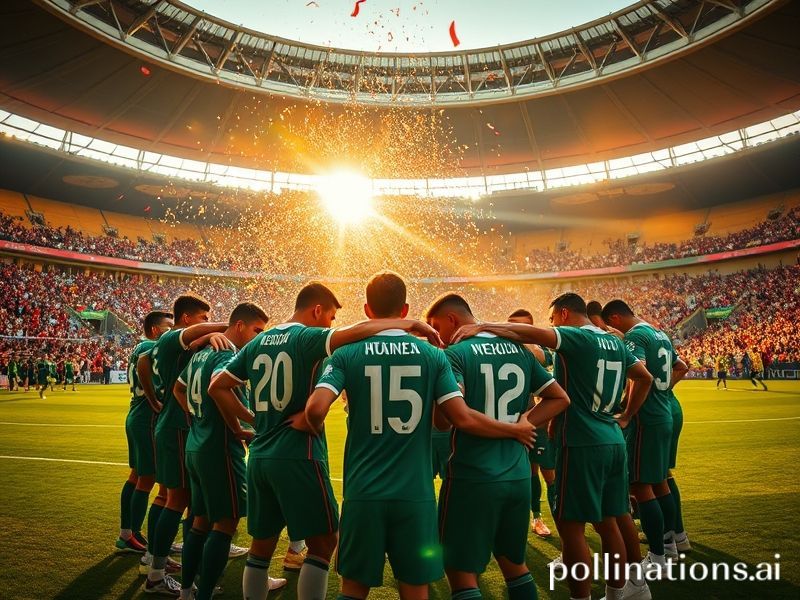Global Heartbreak, Inc.: How Mexico’s Football Team Became the World’s Favorite Tragicomedy
Every four summers, the planet tilts slightly on its axis—not from any cosmic wobble, but from the collective psychic tremor of 130 million Mexicans holding their breath. El Tri, the itinerant national soap opera disguised as a football team, staggers onto the global stage again, and the rest of us pretend we have better things to do. We don’t. From Berlin beer halls that suddenly switch from techno to cumbia, to Tokyo izakayas where salarymen pause their sake karaoke to curse VAR in flawless Spanish profanity, the Selección Mexicana has become the world’s most portable telenovela—complete with improbable plot twists, tragicomic villains, and a guaranteed cliff-hanger ending somewhere around the Round of 16.
In geopolitical terms, Mexico’s football team is a soft-power paradox: a perpetual underachiever that still commands the emotional GDP of a midsized nation. When they face Argentina, the fixture isn’t merely sport; it’s a proxy war of IMF debt spreadsheets and Malbec tariffs played out in cleats. The French, ever eager to philosophize, call it an existential mirror: a squad that embodies the tension between exuberant individualism and systemic self-sabotage. Meanwhile, the English just mutter, “At least they score penalties,” then retreat to the pub to rehearse their own coming disappointment.
The squad itself is a globalization fever dream. A Brighton-born winger who chose the green shirt over afternoon tea; a Serie A libero who speaks better Napolitano than Nahuatl; a striker discovered via TikTok somewhere in the Sonoran desert. Their WhatsApp group—leaked, naturally—reveals instructions from the Mexican-American coach in three languages and one universal emoji: the face-palm. It’s as if NAFTA had a baby, then raised it exclusively on tequila and trauma.
Economically, El Tri is a remittance machine in reverse. Instead of workers wiring dollars home, the team exports angst abroad. Each tournament triggers a predictable cycle: early group-stage optimism spikes avocado futures; a narrow knockout loss crashes the peso; everyone blames the cartels, the altitude, or the Aztec curse—whichever is trending. Goldman Sachs quietly updates its Mexico 2025 forecast under the column labeled “collective psychic scarring.”
Culturally, the phenomenon has spawned an entire genre of Schrödinger’s memes: simultaneously celebrating and mourning a victory that hasn’t happened yet. A popular image macro shows the squad lifting the World Cup while standing in the same spot where the Aztecs greeted Cortés—captioned, “Third time’s the charm, right?” It’s gallows humor for a civilization that learned irony the hard way. Even the Germans, who once dismantled Mexico 4-1 with the chilling efficiency of a Black Forest cuckoo clock, now find themselves weirdly protective: they need someone else to believe in the possibility of change, if only to justify their own 2018 group-stage exit.
The broader significance? Mexico’s football fate has become a referendum on the entire Global South’s ability to rewrite narrative endings. Every Nigerian scam email, every Brazilian favela drone shot, every Indian call-center joke gets momentarily suspended when the Tri is up 1-0 in the 87th minute. For 180 heartbeats, the periphery imagines itself center. Then the equalizer arrives—usually off a set piece, always offside—and gravity reasserts itself. We all exhale, relieved that order is restored, secretly disappointed it isn’t.
And yet, like a telenovela that refuses cancellation, the story reboots every cycle. New coach, same curse; fresh faces, ancient punchlines. The world keeps watching because Mexico’s tragedy is our collective sitcom: a reminder that hope is the most renewable resource on Earth, right after self-delusion. When the final whistle blows and the sombreros droop, the international press corps files identical copy—“Mexico exits valiantly”—then rushes to the airport bar. There, under flickering CNN subtitles, we discover the secret: we weren’t laughing at El Tri. We were laughing at ourselves, translated into impeccable Spanish profanity.







